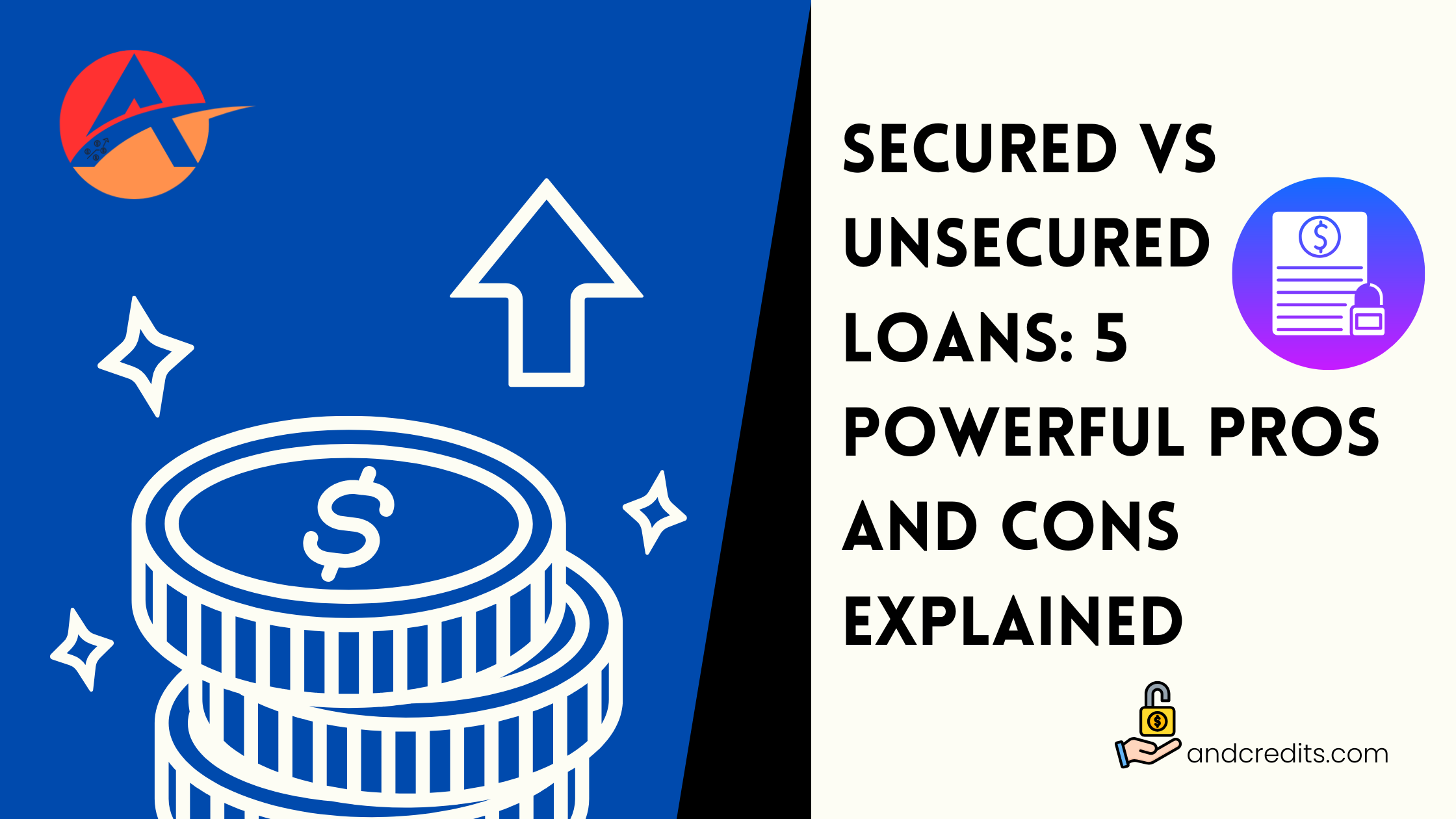Table of Contents
Introduction
Before you take out any loan, it’s important to understand the difference between secured vs unsecured loans. The type of loan you choose can affect everything from your interest rate to your approval chances — and even your personal financial risk.
Thank you for reading this post, don't forget to subscribe!
By knowing the pros and cons of each option, you can make smarter borrowing decisions, avoid common pitfalls, and choose a loan that truly fits your needs and goals.
In this guide, we’ll break down 5 powerful pros and cons of secured vs unsecured loans to help you confidently select the right loan for your situation.
1. What Are Secured vs Unsecured Loans?
Before borrowing, it’s essential to understand the basics of secured vs unsecured loans — these two categories differ in how they work and what they cost you as a borrower.
Simple explanation of secured loans and unsecured loans:
- Secured loans require collateral — an asset you pledge to the lender, such as your home or car. If you fail to repay, the lender can seize the asset.
- Unsecured loans do not require collateral. Approval is based on your creditworthiness and ability to repay. If you default, the lender cannot take property, but your credit score will suffer.
Key differences between the two:
- Collateral requirement: Yes (secured), No (unsecured)
- Interest rates: Lower (secured), Higher (unsecured)
- Risk to borrower: Higher for secured, lower for unsecured
- Approval difficulty: Easier with secured, harder with unsecured if you have bad credit
Common examples of each loan type:
- Secured loans: Mortgage, auto loan, home equity loan, secured personal loan
- Unsecured loans: Personal loan, student loan, credit card, payday loan
2. Pro #1: Lower Interest Rates on Secured Loans
One major advantage of secured loans is that they typically come with lower interest rates than unsecured loans — which can save you a lot of money over time.
Why lenders offer better rates on secured loans:
Because lenders face less risk (thanks to the collateral), they’re more willing to offer lower rates to borrowers.
How using collateral lowers your borrowing cost:
By pledging an asset, you give the lender added security — so they don’t need to charge as much to cover their potential losses. This translates to more affordable monthly payments and lower total repayment.
When to consider a secured loan for major expenses:
- Buying a home or vehicle
- Large home improvement projects
- Consolidating high-interest debt (if you can responsibly manage collateral risk)
3. Con #1: Risk of Losing Collateral With Secured Loans

While secured loans often come with lower interest rates, they also carry an important risk — losing the asset you pledge as collateral.
The downside of pledging collateral:
You’re putting your property (home, car, savings) on the line. If you fall behind on payments, the lender can seize your asset to recover the loan balance.
What happens if you default on a secured loan:
- You may lose your collateral
- Your credit score will suffer
- You could still owe any remaining balance if the asset sale doesn’t cover the full debt
How to protect your assets when using secured credit:
- Only borrow what you can realistically afford to repay
- Build an emergency fund to avoid missed payments
- Communicate with your lender early if financial trouble arises
Check Out: Bad Credit: What Are the Fastest Ways to Fix It?
4. Pro #2: Easier Approval With Secured Loans for Bad Credit
If you have poor or limited credit, a secured loan can be a great way to get approved — and start rebuilding your credit profile.
How secured loans can help borrowers with poor or limited credit: Since secured loans give lenders added security, they’re more likely to approve applications from borrowers with low scores or thin credit history.
Why lenders are more flexible when collateral is involved: Collateral reduces the lender’s risk of loss, allowing them to approve loans they might otherwise deny.
Best types of secured loans for credit rebuilding:
- Secured personal loans from credit unions
- Secured credit cards
- Credit builder loans
5. Con #2: Higher Interest Rates and Fees on Unsecured Loans
Because unsecured loans lack collateral, they typically carry higher interest rates and fees — especially for borrowers with average or poor credit.
Why unsecured loans tend to cost more: Lenders take on more risk when there’s no collateral to back the loan. To compensate, they charge higher rates and sometimes add fees (origination, processing).
How your credit score affects rates and approval odds: Your credit score plays a major role in what rate you’re offered. Higher scores = lower rates. If your score is low, expect higher costs — or even a denial.
Tips to reduce fees and get better terms on unsecured credit:
- Shop multiple lenders for the best offers
- Improve your credit score before applying
- Consider credit unions — they often offer better terms than banks or online lenders
Bonus: Which Type of Loan Should You Choose?

Choosing between secured vs unsecured loans depends on your personal financial situation, credit profile, and goals.
Situations where secured loans make sense:
- You need a large loan with a low interest rate
- You’re building or rebuilding your credit
- You have valuable collateral and are confident in your ability to repay
When unsecured loans are the better option:
- You don’t want to risk losing personal assets
- You need a smaller loan and have good credit
- You want a faster approval process with fewer documentation requirements
How to decide based on your credit, goals, and risk tolerance:
- Assess your credit score and borrowing needs
- Weigh the cost of interest and fees versus the risk of pledging collateral
- Choose the loan type that balances affordability, flexibility, and safety for your situation
Conclusion: Make the Smart Choice Between Secured vs Unsecured Loans
Now that you know the key differences and the pros and cons of secured vs unsecured loans, you can make an informed borrowing decision.
Recap of the key pros and cons: Secured loans offer lower rates and easier approval — but come with collateral risk. Unsecured loans offer more flexibility but may cost more and be harder to qualify for if your credit is poor.
Final tips for responsible borrowing:
- Only borrow what you can repay
- Understand all terms and conditions before signing
- Keep building your credit so you can access better rates in the future
Encouragement to compare offers and choose the loan that best fits your needs: Every borrower’s situation is unique. Shop around, compare secured and unsecured options, and pick the loan that works best for your goals — while protecting your financial health.
For more info: Click Here.
FAQs About Secured vs Unsecured Loans
Is it easier to get a secured or unsecured loan?
It’s generally easier to get approved for a secured loan, especially if you have poor credit — because lenders can rely on your collateral to reduce their risk.
What is the biggest risk of taking a secured loan?
The biggest risk is losing your collateral — such as your car or home — if you fail to repay the loan. Always consider your ability to repay before using secured credit.
Will a secured loan improve my credit faster?
It can, if you make all payments on time. Consistent on-time payments help boost your credit score, whether the loan is secured or unsecured.
